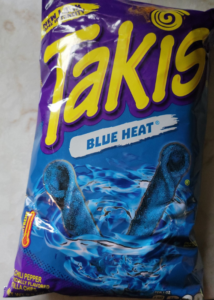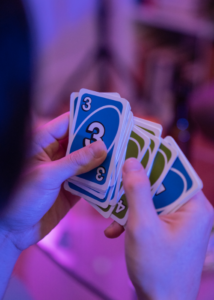Advocate Access
Get In Touch
News
Hope in Action: July 2024
Hope in Action is a series to highlight the aspects of our volunteer work. Advocacy for a child, whether in child welfare, juvenile justice, or truancy systems, covers several activities from court hearings to visits with a child to conversations with parents. Each month, we’ll share a story of a small (or big!) moment from one of our cases that exemplifies what advocacy can mean to a child and their families.
BLUE TAKIS
 Dylan* waited in handcuffs for his detention hearing to start. The 15-year-old violated probation five months after being adjudicated of the allegation in juvenile court. The violation landed him back in detention, and now he faced the judge, alone. His mother hadn’t shown up for the hearing, and his dad wasn’t active in his life.
Dylan* waited in handcuffs for his detention hearing to start. The 15-year-old violated probation five months after being adjudicated of the allegation in juvenile court. The violation landed him back in detention, and now he faced the judge, alone. His mother hadn’t shown up for the hearing, and his dad wasn’t active in his life.
At the hearing, the judge released him to his mom, due to his positive behavior while in detention. While he waited for his mom to arrive, a woman who attended the hearing introduced herself. Her name was Michelle*, and she was his Advocate, appointed that week by the judge. She explained her role was to speak in his best interests during formal hearings. To do that, she’d get to know him, his family, and his school.
“I’m going to come see you at school,” Michelle promised. “I’ll bring a snack. What you do you want?”
The ninth grader didn’t hesitate. “A watermelon Arizona and blue Takis.”
WILD CARDS
 Michelle visited his school, which was DAEP (Disciplinary Alternative Education Program), with the snack. He popped open the watermelon Arizona but wasn’t interested in talking much with his Advocate. Undeterred by the silence, Michelle brought out her secret weapon for getting kids, especially teens, to talk with her—a game she invented called Uno Question.
Michelle visited his school, which was DAEP (Disciplinary Alternative Education Program), with the snack. He popped open the watermelon Arizona but wasn’t interested in talking much with his Advocate. Undeterred by the silence, Michelle brought out her secret weapon for getting kids, especially teens, to talk with her—a game she invented called Uno Question.
“Every kid loves Uno,” she said. “Whoever plays a wild card, gets to ask a question, a plus-two card gets you two questions, a plus-four card, four questions. I’m competitive—told him I was going to beat him. And that motivated him to play to win.”
Michelle held back her wild cards to give Dylan the chance to play one first.
“That’s the key,” she said. “Let the kid ask the first question and answer it, even if it’s shocking.”
And she got the chance to surprise him with her first answer. Dylan played a wild card, and asked, “Have you ever been arrested?”
“Yes.”
It was not the answer Dylan expected!
“No! Really? What did you get arrested for?”
Not so fast. A wild card only got a player one question—he’d have to wait for his next turn! The game continued.
For her first wild card, Michelle asked Dylan to name his biggest obstacle at home.
“We don’t have electricity right now.”
With one answer, Michelle immediately understood the depth of this family’s poverty and what the child was up against to do well at school and successfully complete probation.
MEET THE NEED
The game changed everything—starting an honest conversation between Dylan and Michelle that continued throughout her time as his Advocate. Every time they met afterward, he shared with her about his homelife, school, and future.
After Uno Question finished, Michelle suggested they open the big bag (not the small bag!) of blue Takis she’d brought with her, but he refused. Michelle asked if she’d gotten the wrong kind of Takis.
“No, ma’am,” he said. “This is the kind I like. I just want to take these home, if that’s all right. This will be all my sister and me have to eat tonight.”
Michelle knew that no amount of blue Takis would solve that kind of food scarcity. Her Case Supervisor at Child Advocates connected her with nonperishable food boxes from the Montgomery County Food Bank along with other donations to bring to Dylan and his family.
His Advocate also coordinated with the assistant principal at Dylan’s school to connect him with a program that gave him access to an in-school resource room three days a week. The resource room was filled with basics a family might need, including food, toiletries, and clothing, and Dylan was able to “shop” for his family.
MENTORS AND GOALS
 Michelle’s support went beyond resources. The two had five months until Dylan’s probation ended, and she wanted him to look toward his future. They plotted out goals for Dylan.
Michelle’s support went beyond resources. The two had five months until Dylan’s probation ended, and she wanted him to look toward his future. They plotted out goals for Dylan.
“No one had ever spoken to him about having aspirations,” she said. “Simple, but meaningful goals, such as ‘make the team,’ ‘save money,’ or ‘graduate from high school.’”
Michelle along with the resource program coordinator met with Dylan weekly to check his progress toward his goals. Michelle involved his track coach and assistant principal, too. His only involvement with school had been disciplinary. His coach became an after-school mentor and helped him pick a career track in the high school curriculum. Michelle attended every school meeting for Dylan and advocated for academic support and accommodations in his ARD (admission, review, and dismissal meeting) for his learning disability.
And when Dylan got involved with some trouble at school, she attended the hearing to help the school understand what was going on at home for Dylan and to ask the school to consider other disciplinary actions besides expulsion, which they did.
“He felt invisible, and when I’m there, he knows I’m on his side, through thick and thin.”
HOPE FOR THE FUTURE
That support continued, and Dylan successfully completed probation and the ninth grade without having to attend summer school. He also got his first summer job, all on his own. Though his formal probation ended, as did Michelle’s appointment as his Advocate, she promised him she would be there in three years when he graduated high school.
“The hope is he’s been outfitted with skills to be stronger and make better choices the next time trouble comes along.”
“You get this moment in time to mentor this child well. Then they go back to the home they came from—and their parents may not have made any changes or gotten any services. The hope is he’s been outfitted with skills to be stronger and make better choices the next time trouble comes along.”
*Names changed for privacy


